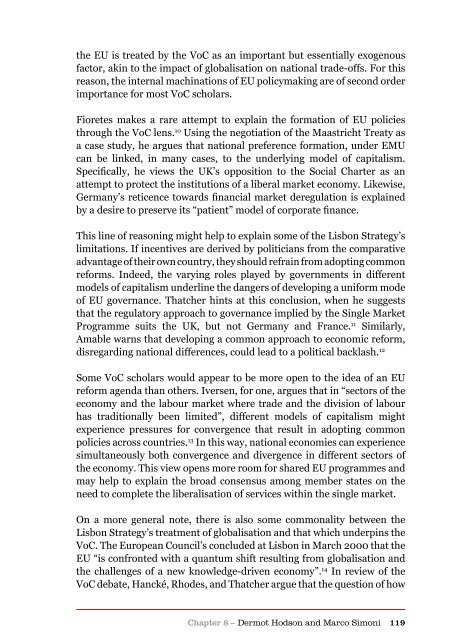Authors Iain Begg | Gabriel Glöckler | Anke Hassel ... - The Europaeum
Authors Iain Begg | Gabriel Glöckler | Anke Hassel ... - The Europaeum
Authors Iain Begg | Gabriel Glöckler | Anke Hassel ... - The Europaeum
You also want an ePaper? Increase the reach of your titles
YUMPU automatically turns print PDFs into web optimized ePapers that Google loves.
the EU is treated by the VoC as an important but essentially exogenous<br />
factor, akin to the impact of globalisation on national trade-offs. For this<br />
reason, the internal machinations of EU policymaking are of second order<br />
importance for most VoC scholars.<br />
Fioretes makes a rare attempt to explain the formation of EU policies<br />
through the VoC lens. 10 Using the negotiation of the Maastricht Treaty as<br />
a case study, he argues that national preference formation, under EMU<br />
can be linked, in many cases, to the underlying model of capitalism.<br />
Specifically, he views the UK’s opposition to the Social Charter as an<br />
attempt to protect the institutions of a liberal market economy. Likewise,<br />
Germany’s reticence towards financial market deregulation is explained<br />
by a desire to preserve its “patient” model of corporate finance.<br />
This line of reasoning might help to explain some of the Lisbon Strategy’s<br />
limitations. If incentives are derived by politicians from the comparative<br />
advantage of their own country, they should refrain from adopting common<br />
reforms. Indeed, the varying roles played by governments in different<br />
models of capitalism underline the dangers of developing a uniform mode<br />
of EU governance. Thatcher hints at this conclusion, when he suggests<br />
that the regulatory approach to governance implied by the Single Market<br />
Programme suits the UK, but not Germany and France. 11 Similarly,<br />
Amable warns that developing a common approach to economic reform,<br />
disregarding national differences, could lead to a political backlash. 12<br />
Some VoC scholars would appear to be more open to the idea of an EU<br />
reform agenda than others. Iversen, for one, argues that in “sectors of the<br />
economy and the labour market where trade and the division of labour<br />
has traditionally been limited”, different models of capitalism might<br />
experience pressures for convergence that result in adopting common<br />
policies across countries. 13 In this way, national economies can experience<br />
simultaneously both convergence and divergence in different sectors of<br />
the economy. This view opens more room for shared EU programmes and<br />
may help to explain the broad consensus among member states on the<br />
need to complete the liberalisation of services within the single market.<br />
On a more general note, there is also some commonality between the<br />
Lisbon Strategy’s treatment of globalisation and that which underpins the<br />
VoC. <strong>The</strong> European Council’s concluded at Lisbon in March 2000 that the<br />
EU “is confronted with a quantum shift resulting from globalisation and<br />
the challenges of a new knowledge-driven economy”. 14 In review of the<br />
VoC debate, Hancké, Rhodes, and Thatcher argue that the question of how<br />
Chapter 8 – Dermot Hodson and Marco Simoni 119

















